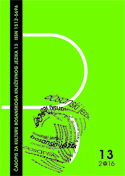Uloga koncepta ‘otvorenosti’ u strukturiranju turskog i hrvatskog vokabulara: kontrastivna analiza
The Role of the Concept ‘Openness’ in Structuring of Turkish and Croatian Vocabulary: A Contrastive Analysis
Author(s): Barbara KerovecSubject(s): Lexis, Semantics, Comparative Linguistics, Cognitive linguistics, South Slavic Languages, Turkic languages
Published by: Filozofski fakultet Univerziteta u Tuzli
Keywords: concept ‘openness’; polysemy; language typology; Turkish language; Croatian language;
Summary/Abstract: The paper explores the role of the concept ‘openness’ in structuring of Turkish and Croatian vocabulary by analyzing different meanings of lexemes which primarily denote concrete, physical openness. The analysis aims to show how different meanings of these lexemes are interrelated and which experiential domains they are related to. Being guided by one of the fundamental thesis of Cognitive Linguistics according to which polysemy reflects the way we categorize our knowledge and conceptualize the world we live in, the paper points to similarities and differences between the two languages with respect to the importance that the concept ‘openness’ has in conceptualizing of other, less concrete and abstract experiences. It also addresses the ways these experiences are lexicalized by taking into account typological differences between the two languages.
Journal: Bosanski jezik
- Issue Year: 2016
- Issue No: 13
- Page Range: 65-78
- Page Count: 14
- Language: Croatian

